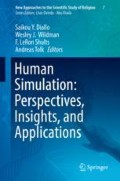Abstract
This epilogue to Human Simulation places the volume’s contributions into the context of the use of models in science, the potential of computational execution of concepts and ideas by using simulation, and the epistemological constraints of such efforts. It proposes that bringing social scientists, humanities scholars, and supporting simulationists together creating human simulations will push the boundaries of what we know and what we can do, moving the frontier between what is theoretically possible and what is practically feasible in support of applicable research methods.
Access this chapter
Tax calculation will be finalised at checkout
Purchases are for personal use only
References
Davies, P., and N.H. Gregersen. 2010. Information and the nature of reality: From physics to metaphysics. Cambridge: Cambridge University Press.
DeLanda, M. 2011. Philosophy and simulation: The emergence of synthetic reason. London/New York: Continuum International Publishing Group.
Gelfert, A. 2016. How to do science with models: A philosophical primer. Cham: Springer.
Goldman, S.L. 2006. Science wars: What scientists know and how they know it. Chantilly: Lehigh University, The Teaching Company.
Humphreys, P. 2004. Extending ourselves: Computational science, empiricism, and scientific method. Oxford: Oxford University Press.
Shermer, M. 2017. How to convince someone when facts fail: Why worldview threats undermine evidence. Scientific American 316 (1).
Author information
Authors and Affiliations
Editor information
Editors and Affiliations
Rights and permissions
Copyright information
© 2019 Springer Nature Switzerland AG
About this chapter
Cite this chapter
Tolk, A. (2019). Human Simulation as a Humble Approach. In: Diallo, S., Wildman, W., Shults, F., Tolk, A. (eds) Human Simulation: Perspectives, Insights, and Applications. New Approaches to the Scientific Study of Religion , vol 7. Springer, Cham. https://doi.org/10.1007/978-3-030-17090-5_13
Download citation
DOI: https://doi.org/10.1007/978-3-030-17090-5_13
Published:
Publisher Name: Springer, Cham
Print ISBN: 978-3-030-17089-9
Online ISBN: 978-3-030-17090-5
eBook Packages: Religion and PhilosophyPhilosophy and Religion (R0)

